Yazmín Ibáñez-García
BLEnD: A Benchmark for LLMs on Everyday Knowledge in Diverse Cultures and Languages
Jun 14, 2024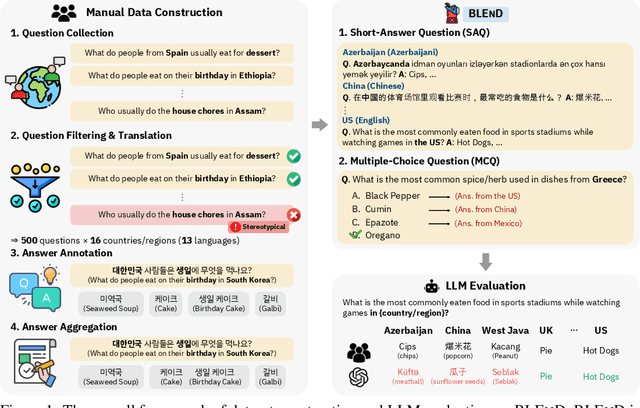
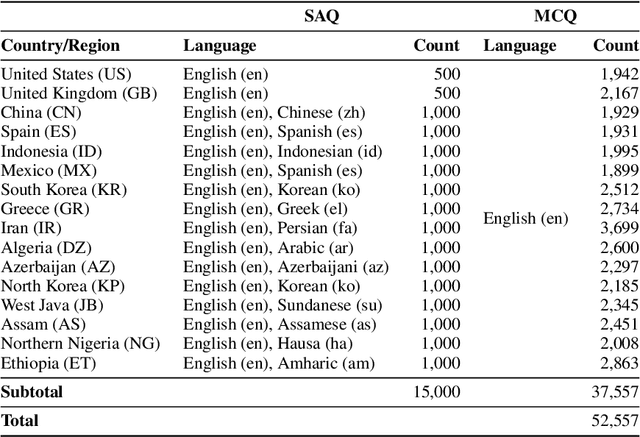
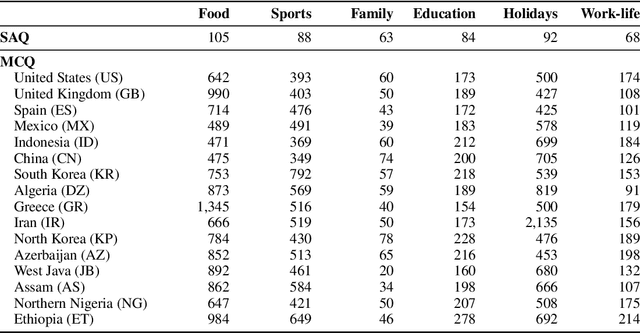
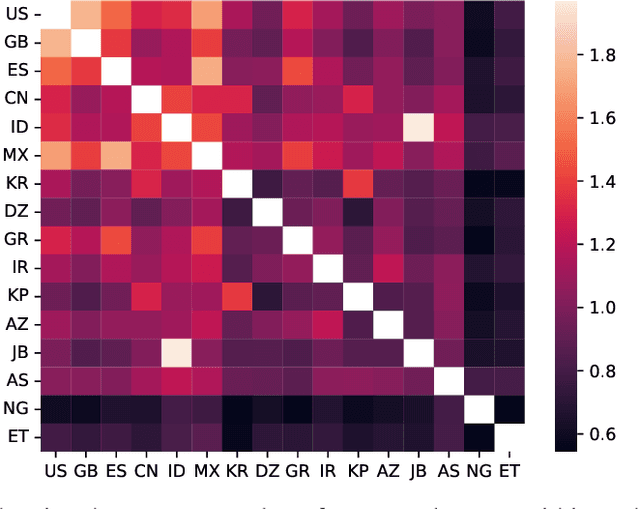
Abstract:Large language models (LLMs) often lack culture-specific knowledge of daily life, especially across diverse regions and non-English languages. Existing benchmarks for evaluating LLMs' cultural sensitivities are limited to a single language or collected from online sources such as Wikipedia, which do not reflect the mundane everyday lifestyles of diverse regions. That is, information about the food people eat for their birthday celebrations, spices they typically use, musical instruments youngsters play, or the sports they practice in school is common cultural knowledge but uncommon in easily collected online sources, especially for underrepresented cultures. To address this issue, we introduce BLEnD, a hand-crafted benchmark designed to evaluate LLMs' everyday knowledge across diverse cultures and languages. BLEnD comprises 52.6k question-answer pairs from 16 countries/regions, in 13 different languages, including low-resource ones such as Amharic, Assamese, Azerbaijani, Hausa, and Sundanese. We construct the benchmark to include two formats of questions: short-answer and multiple-choice. We show that LLMs perform better for cultures that are highly represented online, with a maximum 57.34% difference in GPT-4, the best-performing model, in the short-answer format. For cultures represented by mid-to-high-resource languages, LLMs perform better in their local languages, but for cultures represented by low-resource languages, LLMs perform better in English than the local languages. We make our dataset publicly available at: https://github.com/nlee0212/BLEnD.
Combining Global and Local Merges in Logic-based Entity Resolution
May 29, 2023
Abstract:In the recently proposed Lace framework for collective entity resolution, logical rules and constraints are used to identify pairs of entity references (e.g. author or paper ids) that denote the same entity. This identification is global: all occurrences of those entity references (possibly across multiple database tuples) are deemed equal and can be merged. By contrast, a local form of merge is often more natural when identifying pairs of data values, e.g. some occurrences of 'J. Smith' may be equated with 'Joe Smith', while others should merge with 'Jane Smith'. This motivates us to extend Lace with local merges of values and explore the computational properties of the resulting formalism.
A Description Logic for Analogical Reasoning
May 10, 2021Abstract:Ontologies formalise how the concepts from a given domain are interrelated. Despite their clear potential as a backbone for explainable AI, existing ontologies tend to be highly incomplete, which acts as a significant barrier to their more widespread adoption. To mitigate this issue, we present a mechanism to infer plausible missing knowledge, which relies on reasoning by analogy. To the best of our knowledge, this is the first paper that studies analogical reasoning within the setting of description logic ontologies. After showing that the standard formalisation of analogical proportion has important limitations in this setting, we introduce an alternative semantics based on bijective mappings between sets of features. We then analyse the properties of analogies under the proposed semantics, and show among others how it enables two plausible inference patterns: rule translation and rule extrapolation.
Answering Regular Path Queries Over SQ Ontologies
Nov 17, 2020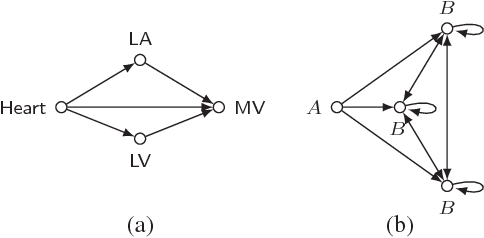
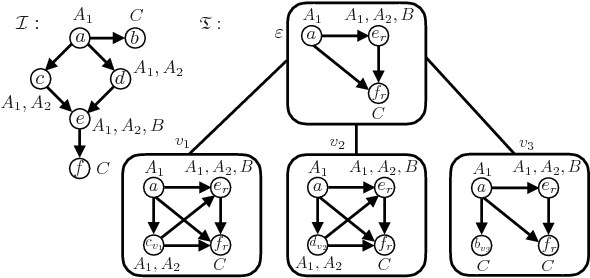
Abstract:We study query answering in the description logic $\mathcal{SQ}$ supporting qualified number restrictions on both transitive and non-transitive roles. Our main contributions are a tree-like model property for $\mathcal{SQ}$ knowledge bases and, building upon this, an optimal automata-based algorithm for answering positive existential regular path queries in 2ExpTime.
On Finite and Unrestricted Query Entailment beyond SQ with Number Restrictions on Transitive Roles
Oct 22, 2020Abstract:We study the description logic SQ with number restrictions applicable to transitive roles, extended with either nominals or inverse roles. We show tight 2EXPTIME upper bounds for unrestricted entailment of regular path queries for both extensions and finite entailment of positive existential queries for nominals. For inverses, we establish 2EXPTIME-completeness for unrestricted and finite entailment of instance queries (the latter under restriction to a single, transitive role).
On Finite Entailment of Non-Local Queries in Description Logics
Jun 30, 2020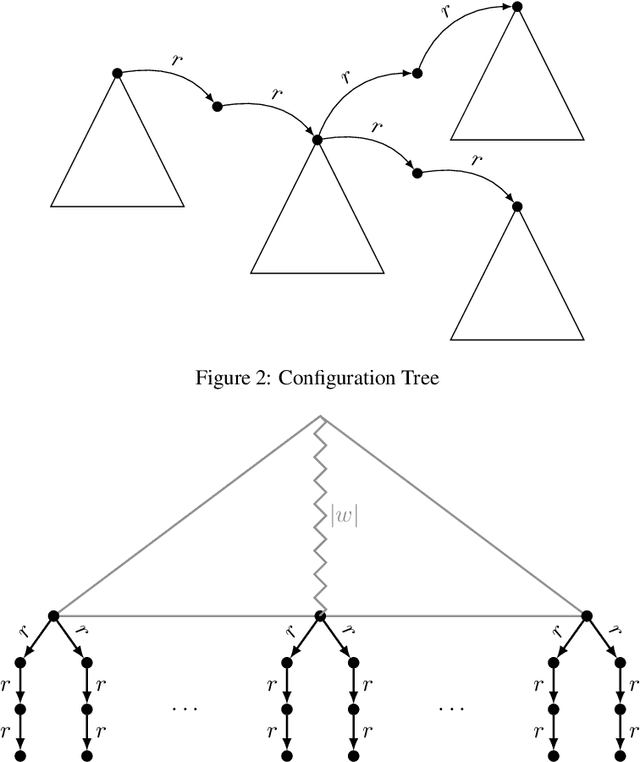
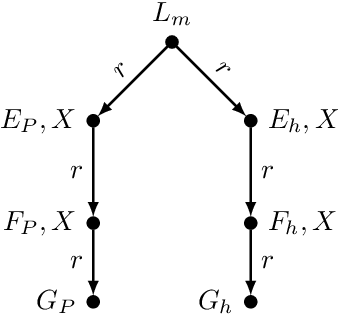
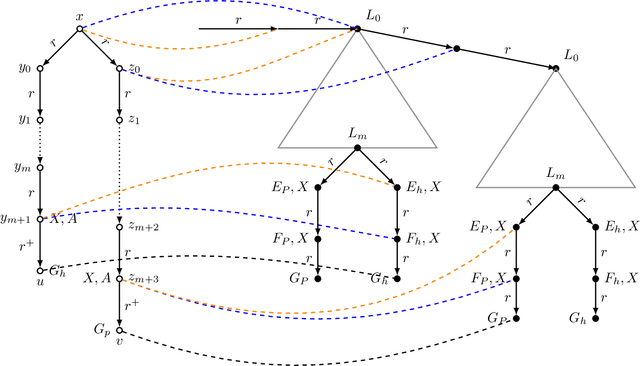
Abstract:We study the problem of finite entailment of ontology-mediated queries. Going beyond local queries, we allow transitive closure over roles. We focus on ontologies formulated in the description logics ALCOI and ALCOQ, extended with transitive closure. For both logics, we show 2EXPTIME upper bounds for finite entailment of unions of conjunctive queries with transitive closure. We also provide a matching lower bound by showing that finite entailment of conjunctive queries with transitive closure in ALC is 2EXPTIME-hard.
Plausible Reasoning about EL-Ontologies using Concept Interpolation
Jun 25, 2020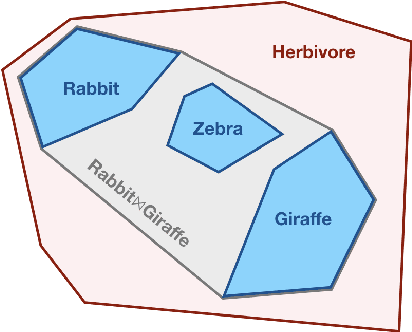
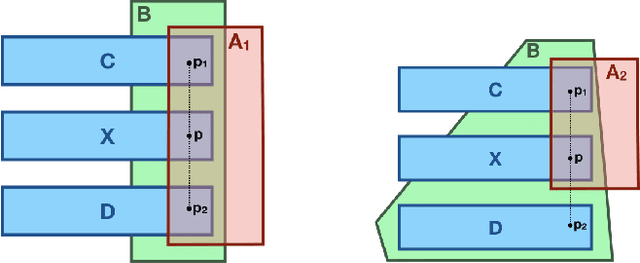


Abstract:Description logics (DLs) are standard knowledge representation languages for modelling ontologies, i.e. knowledge about concepts and the relations between them. Unfortunately, DL ontologies are difficult to learn from data and time-consuming to encode manually. As a result, ontologies for broad domains are almost inevitably incomplete. In recent years, several data-driven approaches have been proposed for automatically extending such ontologies. One family of methods rely on characterizations of concepts that are derived from text descriptions. While such characterizations do not capture ontological knowledge directly, they encode information about the similarity between different concepts, which can be exploited for filling in the gaps in existing ontologies. To this end, several inductive inference mechanisms have already been proposed, but these have been defined and used in a heuristic fashion. In this paper, we instead propose an inductive inference mechanism which is based on a clear model-theoretic semantics, and can thus be tightly integrated with standard deductive reasoning. We particularly focus on interpolation, a powerful commonsense reasoning mechanism which is closely related to cognitive models of category-based induction. Apart from the formalization of the underlying semantics, as our main technical contribution we provide computational complexity bounds for reasoning in EL with this interpolation mechanism.
 Add to Chrome
Add to Chrome Add to Firefox
Add to Firefox Add to Edge
Add to Edge